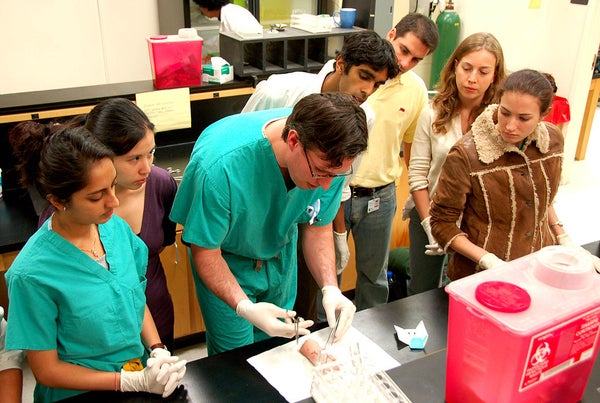This article was published in Scientific American’s former blog network and reflects the views of the author, not necessarily those of Scientific American
The path to becoming a doctor is challenging. It requires at least 11 years of post secondary training and as many as 17 or more for some subspecialists.
The duration of training is matched by its intensity. 80 hour work weeks are the norm and whether 16 hour shifts should be increased to 30 hours passes for legitimate conversation. All of this work is accompanied by little income and a lot of debt. And the reward for getting through training? More work.
As an MD/MBA student at Stanford, my business school classmates frequently marvel at why I would subject myself to this path. After all, there are plenty of careers that require less investment.
On supporting science journalism
If you're enjoying this article, consider supporting our award-winning journalism by subscribing. By purchasing a subscription you are helping to ensure the future of impactful stories about the discoveries and ideas shaping our world today.
I see their point. We are in the midst of recruiting season and every company presentation reveals a tantalizing glimpse of another world. Finance jobs carry the promise of six figure salaries straight out of school and the potential for rapid growth. Tech companies advertise sprawling campuses and countless amenities. Consulting firms discuss opportunities to become leaders of corporate America and change the world.
Even so, business school has actually reaffirmed my commitment to becoming a doctor. Despite the sacrifices, I believe there is a compelling case to go into medicine.
First and foremost, medicine provides the opportunity to do incredibly meaningful work. Career conversations, whether in medicine, business, or otherwise, frequently revolve around making an impact. For me, few experiences rival working with patients.
My third year clinical rotations were full of moments that will stay with me: frantically compressing a patient’s chest until we finally restarted his heart, trying to comfort an inconsolable parent while my resident did a brain death exam on his son, or running around the labor and delivery floor to deliver six babies one night.
Perhaps even more significant were the less dramatic moments: counseling a patient about salt intake after a heart failure diagnosis or playing with a kid during a well-child visit.
Jobs are often several steps removed from their ultimate purpose. An analyst working on a spreadsheet doesn’t necessarily see the effect of his or her work. But patient interactions are a forum in which physicians see evidence of their impact on a daily basis.
At the same time, I see the appeal of addressing problems on a larger scale. Helping patients feels good but many students aspire to transform systems.
Doctors are uniquely positioned to do so. Physician-scientists make new discoveries that save countless lives. Entrepreneurs develop innovative tools that improve care around the world. Business or policy minded doctors can help redesign health care systems, which are in desperate need of physician leadership. The list of opportunities goes on.
Health care is one of the unsolved problems of every society. It is a human impulse to want to live longer and live better. Doctors not only have the privilege of taking care of patients, they have a platform from which they can advocate for health in the broadest sense. There are few challenges more meaningful and motivating than that.
Finally, becoming a physician remains an excellent way to make a living. Many doctors tell premeds they shouldn’t think about lifestyle and compensation in medicine because they would make more money in other professions. It’s clear that the quality of life of many physicians has declined over time with health care reform and increasing bureaucracy.
Regardless, physicians still earn a good income. Even with the debt burden of school, an average doctor makes more than the average business or law school graduate. And a high-earning doctor commands a salary comparable to high earners elsewhere.
Moreover, doctors retain a high social status - a 2015 Harris Poll found that being a doctor is the most “prestigious” profession in the United States. This helps establish credibility and a powerful position from which physicians can launch other ventures if they choose.
A less frequently discussed lifestyle advantage of a career in medicine is that physicians have considerable flexibility in where they choose to live. By contrast, many of the jobs and industries that medical students would otherwise consider are tied to specific cities like New York or San Francisco.
Like any profession, medicine has its share of problems. There are real concerns that must be addressed surrounding physician burnout, the sustainability of practices, and a host of other issues. But as industries accelerate their efforts to recruit talent, students should realize that medicine continues to be an excellent choice.
